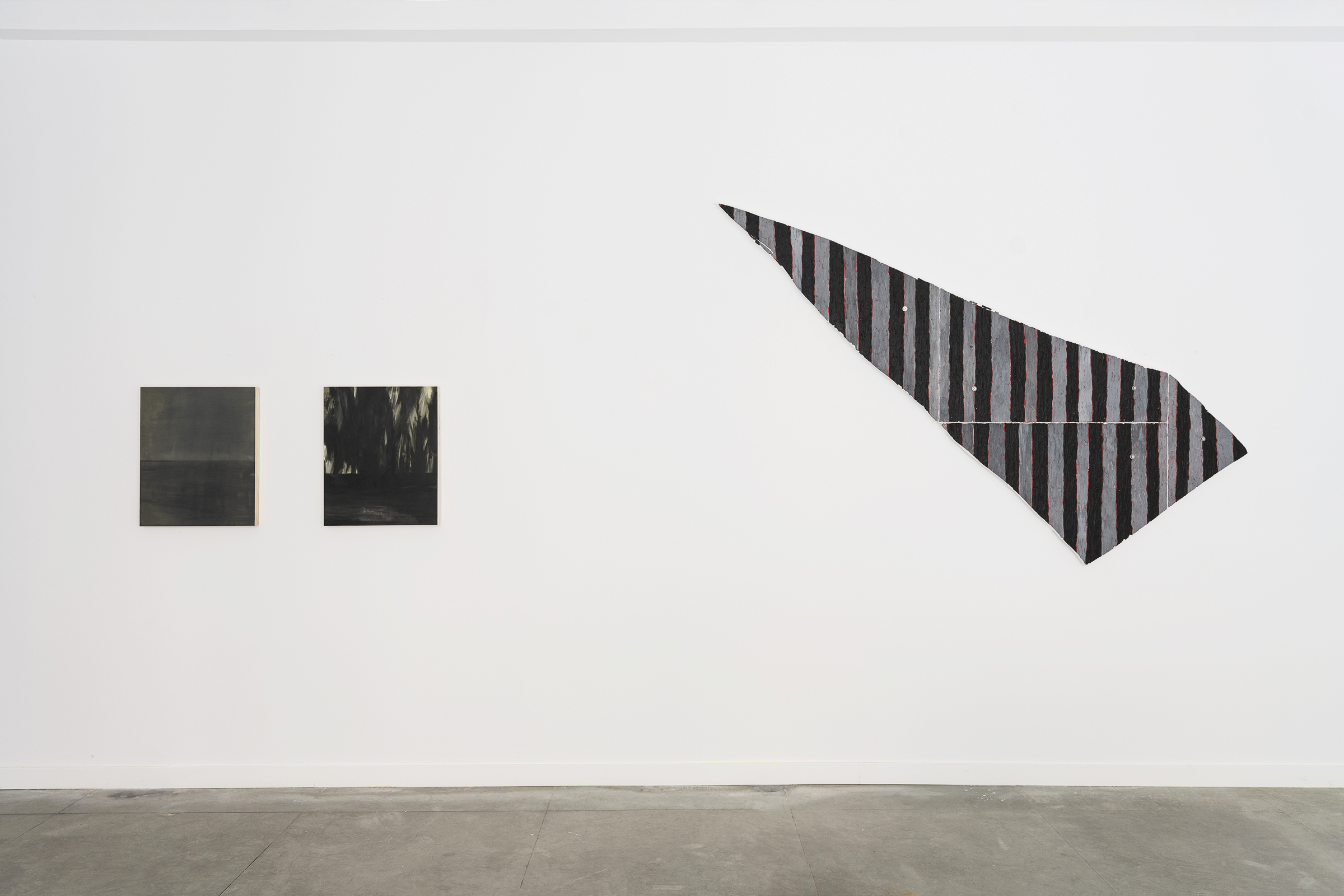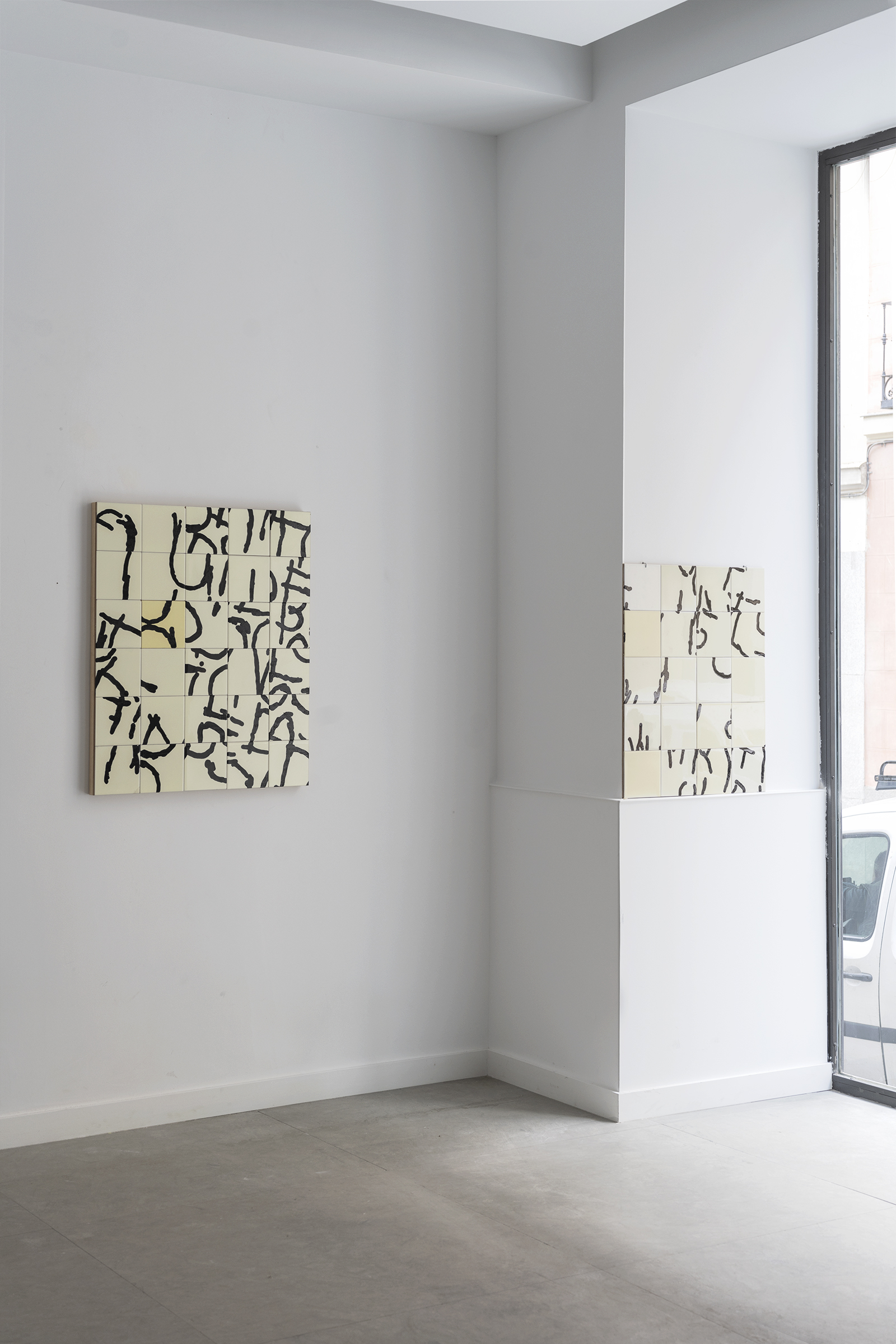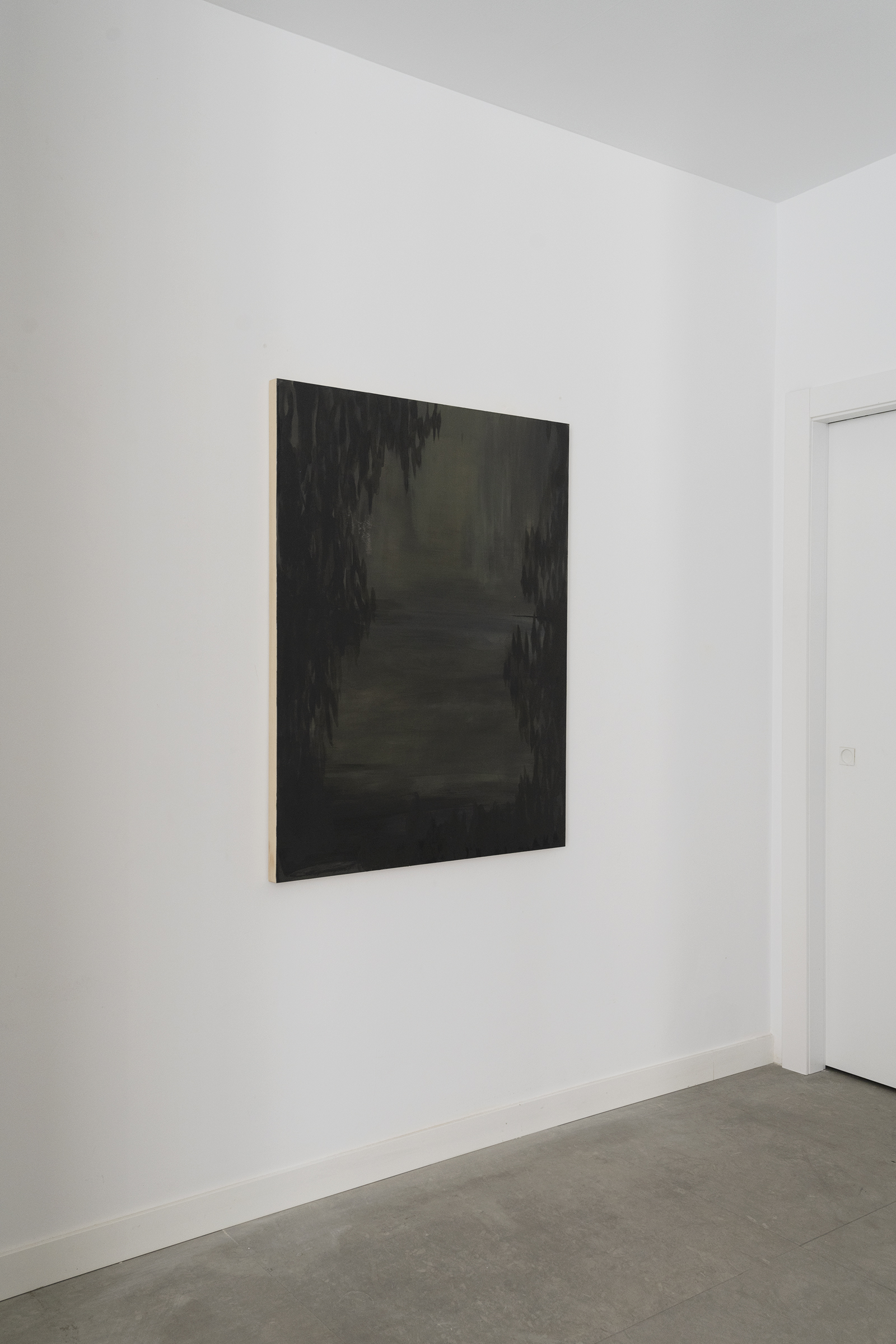[ Versión en español ]
Curated by Sofía Corrales Åkerman
Alzueta Gallery Madrid
February 15 - March 25, 2023
ÁLVARO FERREIRA
BLANCA GUERRER
VIOLETA MAYA
JAVIER MONTORO
MARU QUIÑONERO
MATEO REVILLO
MARIA YELLETISCH
“If there is, at this juncture, a renewed preoccupation with the idea of medium, it is due to the growing interest in making and materiality which, in turn, derives from the recognition of the material and technical record of the work of art as a place in itself and not merely as a support for meaning”
- Graw, I., Painting beyond itself. The Medium in the Post-medium Condition, Sternberg Press, 2016.
A Site presents the work of seven artists whose production is based on the discipline of painting, opens up its margins and opens up its margins. The title alludes to a particular geographical area, the city of Madrid, to which all the artists are strongly linked to. At the same time, following the proposal of the historian I. Graw, the exhibition proposes the idea of the «site» as an alternative way of thinking about the work and its process; ultimately detached from an intention of meaning and relevant for the processes, dynamics or spaces that it can house.
.
We live in a daily explosion of images and information; it is possible that painting is losing its symbolic force. However, no other medium is capable of so directly fusing vision and touch to give form to what is happening in a particular mind and body. Abandoning the debate about the end of painting, the challenge is perhaps to think of a different approach to its «specificity » ; only a plural and complex approach can evade reductivist attacks and channel its relevance today.
Far from offering an ultimate hypothesis that attempts to explain painting today, A Site is born as an invitation to approach each work of art from its intrinsic event, paying attention to that which is to each work from its intrinsic event, paying attention to what is happening on the surface – but also in its support, in its spatial unfolding, in the mind that projects it, in the body that creates it and in the eye that the mind that projects it, the body that creates it and the eye that travels through it.
The works presented are all produced between 2022 and 2023. All the artists present a work in two-dimensional format and another one that is more sculptural, installation, or that expands in some way their usual work or technique. Through them we can through them we can look at a generational condition and at certain issues as universal as they ar as universal as they are typical of our times: the dislocation and reconciliation with identity, the complex relationship with uncertainty, geographical separation, the journey, nostalgia. In turn, the artists included speak of “material as a device” or of “collaborations with the medium”; expressions that draw attention to a renewed agency of gesture and material.








Álvaro Ferreira (Madrid, 1990) presents a series of two site-specific installations and wall pieces in which he uses tile as a material. On a technical level, Ferreria’s work is based on a background in design. In recent years he has developed a recognisable line style; a strong, fast, broken line, with which he draws different motifs and with which, above all, he writes. His work has a strong interest in language, its saturation through digital media and social networks, and the way in which it has been transformed into something superfluous, devoid of meaning. Ferreira’s lyrics are full of small breaks and, as we see in the series "I will destroy your world", totally disordered. In this series the artist explores the relationship that has blossomed with his twin brother over the years, underlying the complexities of identity formation. What appear to be abstract lines are actually the physical deconstruction of written phrases, applied directly to the tiles.
Blanca Guerrero (Madrid, 1990) presents three recent paintings and a series of photographs. Her work moves between different techniques and is always based on a visual and sensory experience, which the artist tries to recreate.Through an exercise of remembrance and recreation, Guerrero rescues the image of certain moments in her life, almost always in nature, moments that have had a strong impact on her. Back to her studio, the artist tries to perpetuate the sensorial nature of fleeting phenomena such as the dazzle of the sun, the darkness of the night, the different shades of the veils of fog, or the light on the surface of water.His aspiration is always to give a physical dimension to a perception; an effort to capture the ephemeral experience of observing.
The paintings, in dark tones, try to recover the vision of ponds or lakes at night. Vague spaces of enigmatic depth; the absence of light confuses figure and frame, as well as the exterior or interior position of the observer.
Violeta Maya (Madrid, 1993) presents a canvas and, for the first time – expanding his work towards the spatial and the textile – an installation of ink on silk cloths. Maya’s painting is an immediate and direct channel through which the artist gives form to her emotional landscape of the moment. Her process incorporates the material qualities of pigment as well as those of the support itself. Maya exposes these elements (the pigment and the canvas) to uncontrollable factors such as humidity – by soaking the canvasses before painting – and time, which marks the drying and the end of each work. Thus, his work is a conscious and double exercise where the projection of a sensation and the contingency dictated by other forces, the intention of an image and its result impregnatedan image and its result impregnated with chance.
In the installation Maya superimposes eight painted canvases. In this work the artist expands her practice towards a format that highlights key aspects of her painting; randomness and movement. The light and the breeze are factors that constantly condition and constantly modify their colour and form, generating infinite versions of the final result.
Javier Montoro (Madrid, 1994) presents in this exhibition a painting and a sculpture-furniture. His work often takes existing forms, objects and codes that belong to the urban context – such as sign strips or geometric patterns taken from seats on public transport – and subverts or cancels them, proposing new and mixed visual rules. The result is often geometric, playful, sometimes serious. “Grids, bands and fractions of flat colours derived from computer-generated patterns are interspersed with adhesive tapes, digital prints and drawings, bringing geometric formalism and the found object together in cryptic and scenic assemblages”.
From the central sculpture presented in this exhibition (D.C.7, 2022) we can understand many aspects of his work. Made from plywood, MDF, pine wood, screen-printed bus upholstery, plastic bus handle and hardware, this piece shows a way of making and thinking that the artist has developed in recent years, and which is transversal in his practice, regardless of format or size. His work is the result of combining assemblages of industrial materials with plastic interventions, incorporating and recycling scraps, discards and discarded objects. The artist overlaps layers, distorts established geometric languages, and finally creates new hybrid pieces where these codes and objects collapse and are reborn.
Mateo Revillo (Madrid, 1993) exhibits a new large wall piece and several small works of wax poured on concrete. His work traverses and collapses a long timeline; his works are influenced by archaic muralism with minimalist and conceptual gestures. Revillo starts from an initial geometric unit and breaks it down into fragments, which expand and unfold on the wall. An exercise in mathematics and unfolding that generates new spaces, and at the same time opens up like a crack or debris from the past.
Each square or rectangular plasterboard is worked as if it were a bas-relief.On top of it, a layer of cement; a second skin which is then painted in encaustic (melted beeswax mixed with pigments). In the end, this first piece is broken and the different blocks climb and expand, giving the work an open format, a new organic form.With a superposition of completely unique techniques and materials, and from a place that is more mystical than intellectual, Revillo’s work presents a painting that tells its own story and creates its own space.
Maru Quiñonero (Murcia, 1979. Lives and works in Madrid) presents three works in pencil on paper. Quiñonero’s work approaches abstraction from a personal and emotional perspective; the artist approaches this language as an intimate way of working with reality, her reality. Disassociating realism from figuration, Quiñonero argues that colour and form can be more faithful to a precise idea than narrative or explicit language.
Her drawings often pose vibrant encounters between blocks of colour, entities that zoom in and out with an unsettling internal velocity. Like a moment of pause in a dance, these rounded forms want to approach and exist together while asserting their uniqueness with careful stroke, measured repetition and precise line. In larger formats, such as the one presented in the exhibition, Quiñonero creates powerful individual forms, forms in which a large size and presence coexist with a systematic, slow and delicate process. Thus, after a first encounter with firm, outlined stains, the viewer is invited to get to know the intrinsic event of the work, the very history of its configuration. Through a slow journey we can access the artist’s own gestural – and temporal – register.
María Yettelisch (Barcelona, 1987. Lives and works in Madrid) shows us new ceramics and two oil paintings. The artist bases much of her work on the practice of repetition and understands this action as an almost meditative act. After an initial selection of colours, which she takes from specific landscapes and personal experiences in nature, Yettelisch selects the colours and begins a process of repetitive trance where she applies them all at once, making the work in a single batch, usually on the same day – in short brushstrokes or looping strokes. From the top left to the bottom right corner. Yettelisch speaks of his creative process as a place of productive contradiction; a place where he wants to enter and where he wants to leave, closely linked to his state of mind; intimate, open spaces where time is repetition, haste is translated into rapid strokes and rhythm marks the landscape.
